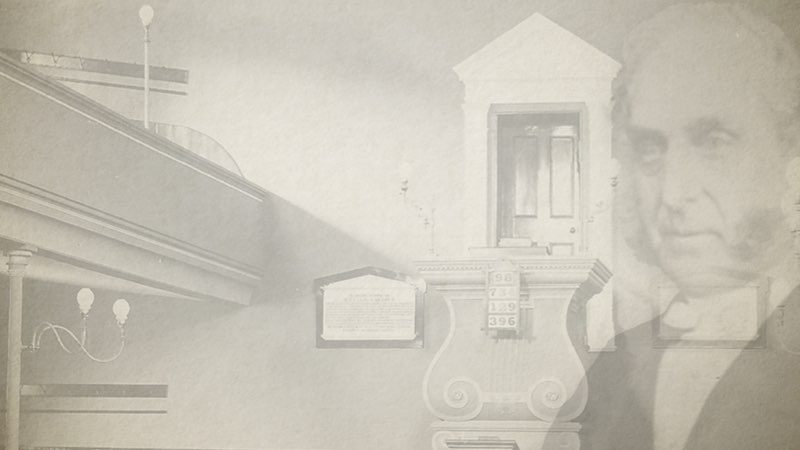
The Life And Testimony Of Mrs. John Grace
The Sower 1880:
Widow Of The Late Mr. John Grace, Minister, Of Brighton
Almost with the ushering in of the new year the work of death was renewed among our friends, and one known, by report at least, to many of our readers, and much loved by a wide circle of godly friends, was called to her eternal home and rest, after some years of affliction and suffering. We refer to the widow of the late Mr. John Grace, minister, of Brighton, a man of blessed memory in the Church of Christ. Mrs. Grace had for some time been almost wholly confined to the house through the increasing severity of her complaint, bronchitis, and during the last few weeks of 1879 she was compelled to keep her room, and finally her bed, which she did not again leave until her ransomed spirit departed to be “for ever with the Lord.” Although she was not one who could talk of what some call great things as to her own experience, yet, as a partaker of grace, her conversation savoured of the fear of the Lord, and her life evidenced her to be one who had an appetite and a heart for Christ, His Word, the ministry thereof, and the blessing which makes all profitable to receiving souls. We have frequently seen her countenance beam with joy when the Word of the Lord has been found by her to be a word spoken in season, whereby her hope in Christ has been confirmed, her faith increased, her evidences cleared, and her heart enabled to hang by faith upon the all-sufficient merit and blood of Jesus, the Son of God. She took pleasure in meeting with the people of God in the service of His house, and in hearing the Word of His grace faithfully preached; but nothing short of feeding on the Word by finding Christ as therein set forth brought nigh to her heart, would give her satisfaction and peace. Some few weeks before her death, while her daughter on one occasion was gone to the house of God, she was very greatly favoured of the Lord by being enabled to view her interest in His love, blood, and covenant, of which rich streams she drank until her face beamed with delight, and she said, when her daughter returned, she felt her communion with Him whom her soul loved had been so sweet that there was no room in her heart for anything else; and to a friend who called in to see her she said how the Lord had so filled her with His goodness that she could feel satisfied all was perfectly right in His various dealings with her, both as to her afflictions, her circumstances, the family, her spiritual exercises, and all things which pertained to her salvation and peace. This blessed token of divine goodness and love seemed like an anointing for her burial, for it was not long before she was called to enter the swellings of Jordan, and there to realise the faithfulness and sufficiency of Him in whom all the promises are yea and amen.
Her youngest daughter, in giving a few particulars of her end, says:—
On Thursday, December 18th, I came from London to help to nurse our dear mother, whom I found very ill—not worse upon the whole than I expected to see her, and able to take an interest in many things; but as each day passed she got worse, so that we did not once have reason to hope or believe she would be restored to us. It was indeed comforting to me to find how glad and relieved she was to have me to take a share in the nursing. She said, “How wonderfully it has been all arranged! How I did beg of the Lord to direct you; and it has all been done without my saying anything.” This she said many times. It seemed as if a great load had been taken off her mind, for she had feared that the strain upon R—— would be too much.
One night, when I had put her straight and was going to the chair to rest, she said so affectionately, “Good night, my dear child; the Lord reward you for all your kindness to me.” All through the illness she was wonderfully sustained, and very patient, and so fearful lest we should be tired out. Her favourite hymn was 356, Gadsby’s—”Does the Gospel Word proclaim, Rest for those who weary be?”, and she wanted me to read it to her the morning after I came. She seemed much to enjoy some of the hymns, and often asked for a hymn or two and a Psalm. On reading “O Zion, afflicted with wave upon wave,” she said, “That is just the hymn I wanted. I was trying to think of it this morning.” In the night, seeing R—— crying, she said, “I have thought so much about leaving you, but I feel that God will be a Father to the fatherless;” and on R—— saying, “I feel quite reconciled to parting with you, seeing you are such a sufferer,” she answered, “I am so glad;” and then, as if thinking aloud, she said quietly, “Though I walk through the valley of the shadow of death, I will fear no evil, for Thou art with me: Thy rod and Thy staff they comfort me;” and again—”Confirmed by one soft secret word, I seek no further light, But walk depending on my Lord, By faith, and not by sight;”, and soon after—“’Cheer up, desponding soul,’ He said, ‘Thy sins are all forgiven.'”
One afternoon she said, “I asked them whence their victory came,” and wanted the verse finished for her; then wanted, “Gold in the furnace tried,” and the next hymn, “Happy the man that bears the stroke.” Then washing her one morning, she said—”‘And pass the river telling, The triumphs of my King;’”, and when we had found and read the hymn, she said, “I don’t think I can have been deceived, and have deceived so many good people.” At another time she said, “It does not signify to me what anyone thinks of me. I want to know from the Lord if I am right.” On the last Saturday she was quiet for some time, and we thought she was asleep, but she said, “I have not been asleep. I have had a sweet visit. I wish I could tell you all about it. Perhaps I ought not to say sweet, but I thought Jesus came into the room, and someone asked, “Who is that?”, and I said, “Don’t you know? It is Jesus;” and He said to me, “Peace I leave with you, My peace I give unto you.” “In My Father’s house are many mansions: if it were not so I would have told you. I go to prepare a place for you.” Sitting by the side of her one day, she said to me, “I can’t think but the Lord intends it all for me. I don’t think I can be deceived.”
She continued to get worse and worse. Her breathing was so distressing, and she suffered so much, that talking was a great trouble to her, and the last two days we had to go quite close to her to hear what she said. Her sufferings lasted to the end of her life, so that we could rejoice and thank God when, at ten minutes past six on the morning of the first of January, 1880, the last breath was breathed, and we knew that her sufferings were at an end, and that she had entered that “rest that remaineth for the people of God.”
She was buried on January 6th, in the same grave where the remains of her beloved husband had been laid some years before in the cemetery at Brighton. Mr. Hull officiated at the funeral, and preached in Galeed Chapel in the evening from the appropriate words, “And they shall be Mine, saith the Lord of hosts, in that day when I make up My jewels” (Mal. 3:17).
Mrs. John Grace (?-1880) was a sovereign grace believer, wife of John Grace, pastor for many years at the church meeting at Brighton.



